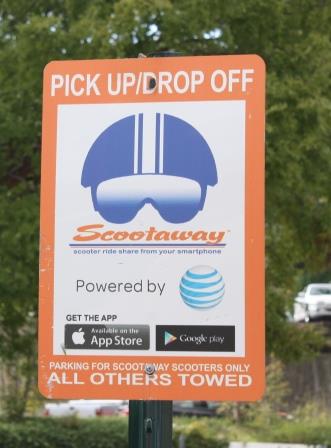Shiny mopeds are becoming a common sight motoring along the streets of Columbia and clustered in parking lots of local businesses, the University of South Carolina and off-campus housing developments.
They belong to Scootaway, an on-demand moped rental business that launched in Columbia in May 2015. The company started with 38 scooters. Since then, it has added several hundred more.
It’s akin to the ride-sharing service Uber, with Scootaway riders downloading an app on their smartphones, approving a user agreement and paying $2.99 per half-hour to ride the scooter. There are more than 50 pick-up and drop-off locations around Columbia, and the scooter riders are provided with helmets, insurance and gas.
Offering a convenient mode of transportation in a growing city and easy parking near a sometimes congested urban campus, the company has said it is also looking to expand to more cities around the state and nation.
It’s just one example of the sharing economy, also known as the peer-to-peer economy, that allows people with goods, services or skills to connect with people in need of that service without going through a traditional business to handle the transaction. Other examples are eBay, Zipcar, Vacation Rental By Owner and Airbnb.
While these business offer opportunities for residents and visitors, the sharing economy presents something of a balancing act for municipalities.
Melissa Gentry, assistant manager of operations for the City of Columbia, said Scootaway and the emergence of food trucks offer two examples of the city working to balance and serve various constituencies.
"We want to offer our citizens all those neat opportunities. We have to get out of the traditional mold and recognize there are new approaches and opportunities, but we also need to support our traditional businesses," she said. "We need to balance the innovative approaches with the brick-and-mortar businesses and make sure you offer opportunities to all."
For example, with food trucks the challenge comes in because it’s a different way to utilize space, she said. "You need to look at these and look at traditional restaurants and make sure opportunities exist for both."
The emergence of the sharing economy offers all sorts of positive applications but offers some first-time issues for cities, towns and states to address.
For example, scooter rentals offer benefits to cities such as reducing the large four-wheel vehicles on streets and in parking areas, while giving individuals the opportunity for transportation to-and-from work and school. The rental companies also offer cities and towns revenue streams through business licenses, taxes and fees.
Still, the first concern for municipalities is public safety, meaning any business that operates must be safe for both the users and the people providing the service. Mopeds are largely unregulated types of activities at the state level, and there is not much cities and towns can do to regulate them. That presents some issues for the General Assembly, which is working to determine if—and how strictly—scooters should be regulated.
As sharing economy businesses sprout up, cities must determine how to handle and enforce regulations for issues including, zoning, building permits and parking.
And while businesses like Scootaway and Uber are breaking in and thriving in larger cities or ones with substantial college student or tourist populations, the sharing economy will expand into smaller cities and towns.
About Scootaway |
| What: An on-demand moped rental business How it works: A user downloads an app onto a smartphone through the Apple Store or Google Play. The user registers through the app, locates a scooter on a map, sees how many are available at that location and reserves a scooter. Using a smartphone, the rider unlocks the scooter, gets the helmet out from the compartment under the seat and starts the scooter. Scooters are returned to one of the Scootaway parking areas and locked. Cost: $2.99 for 30 minutes Also: Insurance, helmet and gas are provided with each scooter. All scooters are equipped with GPS so they can be tracked, located and turned off remotely. |

